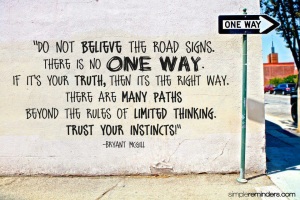What is your direction of travel?
Understanding the mental models that underpin our nation’s governance arrangements helps us understand current trends and the direction of travel that would promote a better balance of power in the system, improved relationships and more constructive debates between players.
Is this leadership?
Our society, economies and indeed, the future of the planet, are threatened when influential leaders sidestep inter-dependence and instead, promote individualism.
Once more unto the breach
What lessons for systemic leadership can emerge from the messy and complex world of public inquiries? Can such inquiries promote culture change?
The road more travelled
How will Ayn Rand’s advocacy for individualism affect the leadership of Sajid Javid – a great admirer of hers – at the Home Office. Will it prevent him from seeing the system that he is part of?
Seeing the system clearly
Amber Rudd had a lightbulb moment when the system came into view in the immigration crisis. But it came too late to save her reputation. It can be hard for leaders and organisations to learn systemic lessons.
Tough on targets and tough on the causes of targets
Watch out! Targets are a widely used management device to force performance, but they spell trouble. Targets stem from the now-outdated scientific management model and take no account of modern systems and complexity science.
Can there be one right way to do anything socially complex?
‘One-size-fits-all’ best practice is a mistaken idea. Complexity calls for a variety of ‘good practice’ by permitting more personal discretion and judgement.
Why and where competency frameworks succeed or fail
Where frameworks add value and where they don’t – and how specifying and assessing competency sucks up energy and disregards peoples’ real performance challenges and results.
Are we ‘individuals’ or ‘people’ at work?
The Second Amendment of the US Constitution speaks of the right of the people to keep and bear arms. This confuses the rights of people as individuals with the rights of people collectively and in general. Organisations make a similar mistake when they speak of ‘individuals’.
I understand the policy. Now what are the politics? How can we make this fly?
Tony Blair’s favourite question was ‘How can we now make this fly’. The question recognises that the best technical solution to a problem and the most rational decision about it do not in themselves guarantee acceptance. (Originally published 11th May 2011)
How should organisations engage with their employees?
Moving beyond McGregor’s ‘Theory X’ and ‘Theory Y’ of the 1960s, and drawing on the work of Hannah Arendt and Andreas Weber, suggesting a feelings-based interior subjectivity as a measure of a system that is truly alive.
Looking for earlier material?
The archives contain an extensive range of blog posts created prior to the launch of this site. You’ll find some that are particularly relevant today.












